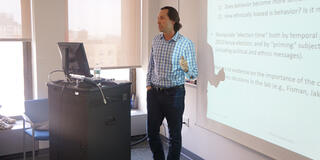Understanding Ethnic Cooperation & Elections: Evidence from Kenya

Does individual behavior become more selfish during elections? How ethnically biased is behavior? Does it become more biased in election times? These were the questions raised by Edward Miguel, Oxfam Professor of Environmental and Resource Economics at the University of California, Berkeley, during a recent talk at SIPA.
Entitled, “Understanding Ethnic Cooperation and Elections: Evidence from Experiments in Kenya,” the April 3 event was part of the Center for Development Economics and Policy’s Spring Development Seminar.
Ethnic divisions are a major issue in many African countries’ politics and are often associated with negative outcomes ranging from slow economic growth to political corruption and armed conflict. Kenya is no exception – ethnic divides are central to Kenyan party politics. In the wake of the 2007 national election between President Mwai Kibaki (an ethnic Kikuyu) and Prime Minister Raila Odinga (an ethnic Luo), ethnic violence broke out across the country as the elections were thought to have been rigged. The conflict resulted in over 1,000 deaths and hundreds of thousands of displaced Kenyans.
Five years later, when the country began to prepare for another presidential election, Ted Miguel and co-authors sought to explore how elections influence individual behavior. “If you think about what could happen in election times,” he says, “it is hard to anticipate exactly how behavior might change.”
Miguel explains that on one hand, “you might think elections create a national rhetoric that brings people together, making them more altruistic and connecting them through common ideals.” On the other hand, ethnic divides in party politics could lead to increased ethnic bias: “Elections are competitive, and in Kenya’s case in 2013, the country was just coming off of a very violent round of elections and there was a lot of fear of more ethnic-based political violence.”
To measure how selfishness and ethnic bias changes during elections, the authors conducted two rounds of experiments with over 1,300 participants from ethnically distinct, working-class neighborhoods in Nairobi. The first “non-election” round was carried out nine months before the March 2013 national election, with the second “election” round taking place immediately before the election. By conducting two rounds of experiments, the authors were able to observe how behavior changed as the election became more salient in participants’ minds.
In each round, participants used touch-screen computers to play three games designed to observe selfishness and ethnic bias. Standard “dictator” and “public good” games were used to measure willingness to share with an anonymous partner or contribute to a public fund, respectively. Miguel explains, “The public good games have three players in each group. A participant decides how much money to put into a public fund, that money is doubled, and then it is equally distributed to everyone – so the participant only gets back two-thirds of each dollar contributed. Therefore, a participant’s giving relies on some kind of sharing or cooperative norm.” Additionally, a new “choose your dictator” game was used to observe if individuals were more likely to allocate resources to a member of their own ethnic group than to someone of a different ethnicity.
The study revealed that, overall, generosity fell by a substantial 15 percent in the immediate pre-election period, relative to nine months prior to the election. “This could suggest that people become more selfish in stressful and uncertain times,” explained Miguel.
Even more striking was that the study revealed no evidence of ethnically-biased behavior in both non-election and election times. Although ethnic divisions are central to Kenyan party politics, Miguel says, “It appears that normal Kenyans, making every-day economic decisions, do not have particularly strong co-ethnic preferences. It is possible, therefore, that ethnic divisions are instead mobilized by political leaders and elites.”
“Elections and Ethnic Cooperation: Evidence from Experiments in Kenya and Tanzania” is a joint research project conducted by Lars Ivar O. Berge, Kjetil Bjorvatn, and Bertil Tungodden of the Norwegian School of Economics; Simon Galle and Edward Miguel of the University of California, Berkeley; Daniel Posner of UCLA; and Kelly Zhang of Stanford University.
— Frank Mamo MPA ’14